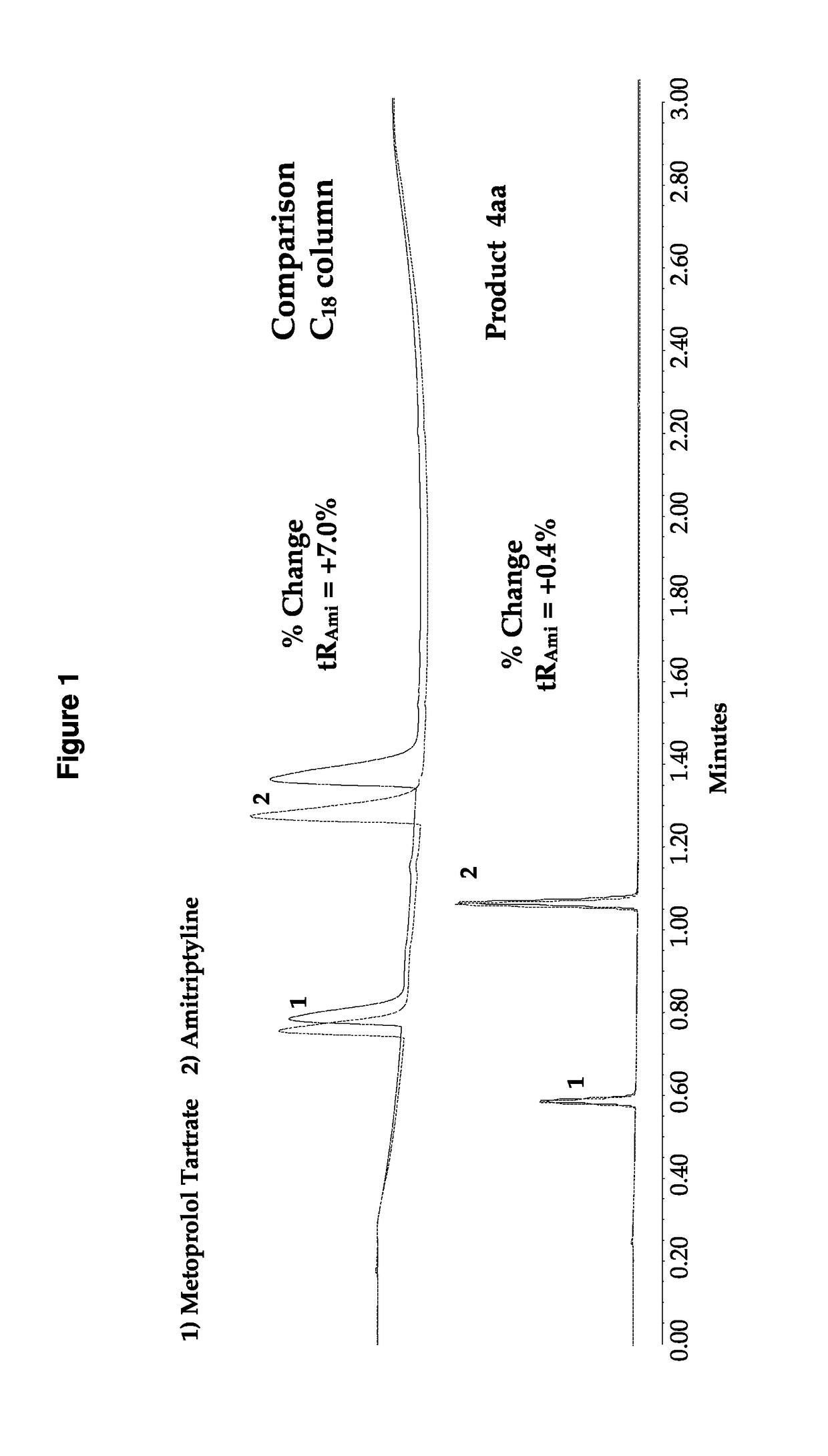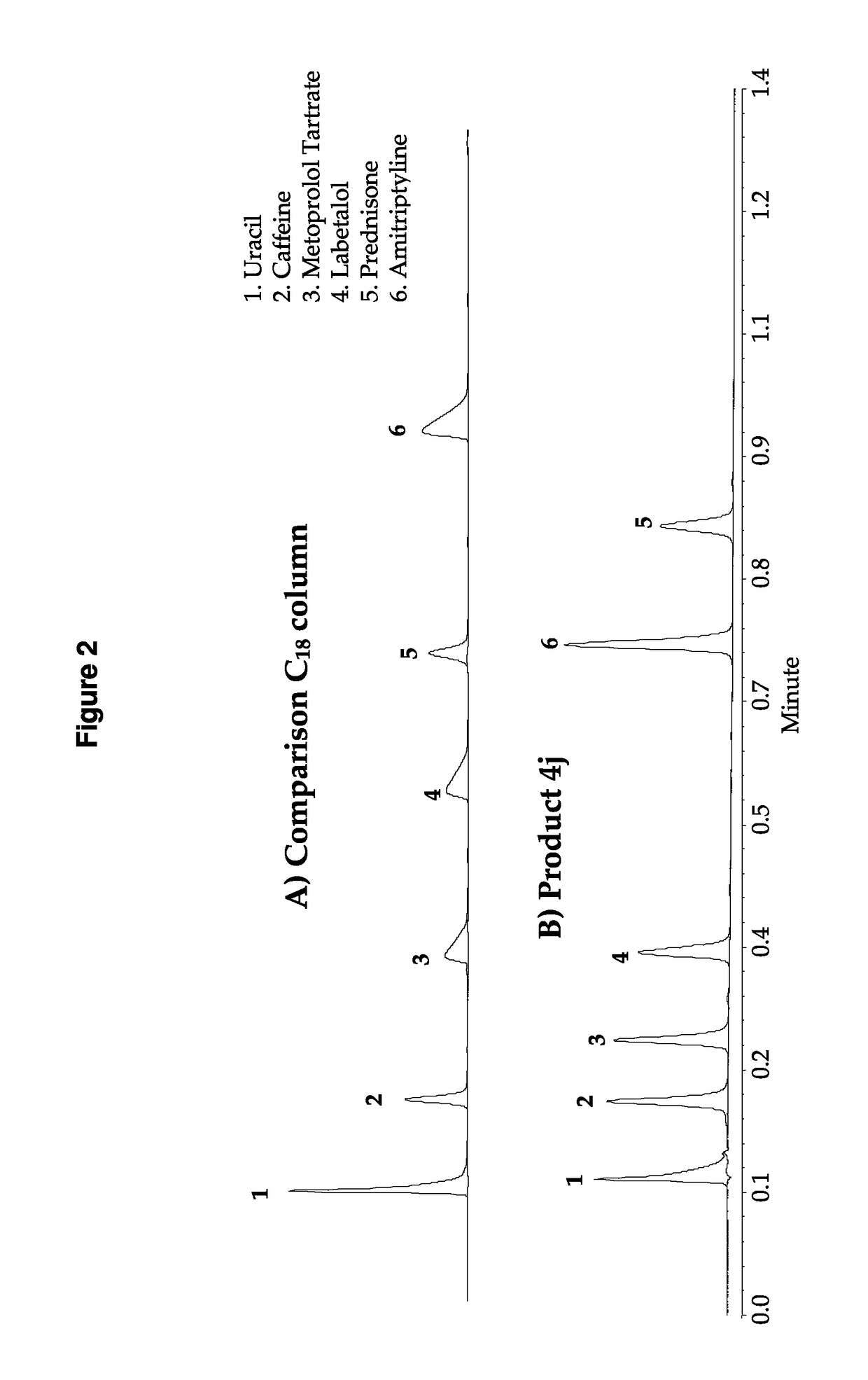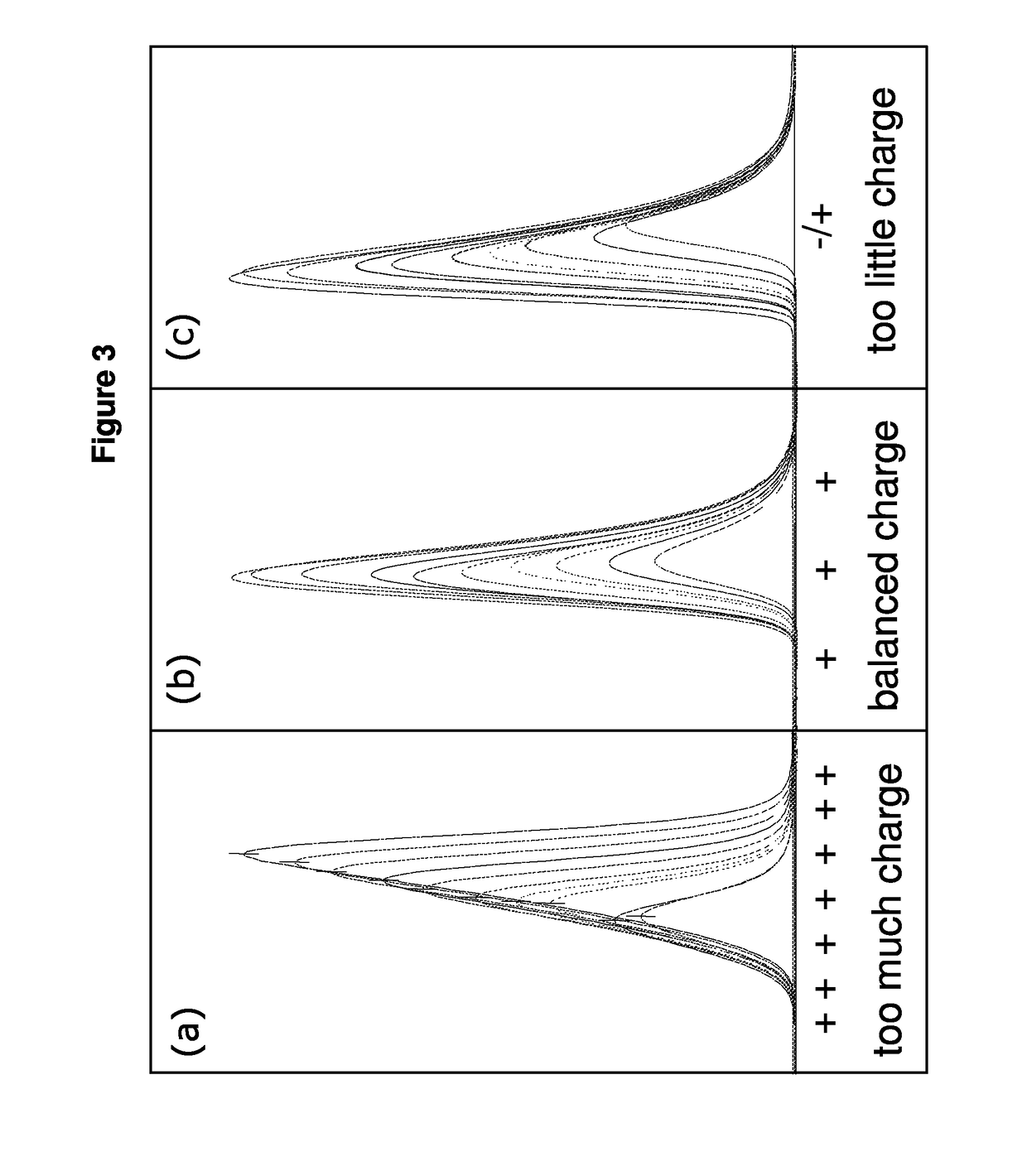High purity chromatographic materials comprising an ionizable modifier
a technology of chromatographic materials and modifiers, which is applied in the direction of ion-exchangers, other chemical processes, separation processes, etc., can solve the problems of low efficiency, shrinkage and swelling of organic chromatographic materials, and lack of mechanical strength of typical chromatographic silica
- Summary
- Abstract
- Description
- Claims
- Application Information
AI Technical Summary
Benefits of technology
Problems solved by technology
Method used
Image
Examples
example 1
[0229]BEH porous hybrid particles (15 g, Waters Corporation, Milford, Mass.; 6.5% C; SSA=186 m2 / g; SPV=0.79 cm3 / g; APD=151 Å) of the formula (O1.5SiCH2CH2SiO1.5)(SiO2)4 (prepared following the method described in U.S. Pat. No. 6,686,035) were refluxed in toluene (100 mL, Fisher Scientific, Fairlawn, N.J.) using a Dean-Stark trap for 1 hour. Reaction 1a used 7.2 g BEH material. Upon cooling the Component A silane additive was added, which included aminopropyltriethoxysilane (APTES, Gelest Inc., Morrisville, Pa.), 2-(2-(trichlorosilyl)ethyl)pyridine (2PE, Gelest Inc., Morrisville, Pa.), 2-(4-pyridylethyl)triethoxysilane (4PE, Gelest Inc., Morrisville, Pa.), N-trimethoxylsilylpropyl-N,N,N-trimethylammonium chloride (QPTMS, 50% solution in methanol, Gelest Inc., Morrisville, Pa.) or chloropropyltrimethoxysilane (CPTMS, Gelest Inc., Morrisville, Pa.). The reaction was heated to reflux for 1 hour. Upon cooling, imidazole (Aldrich, Milwaukee, Wis.) and octadecyldimethylchlorosilane (Compon...
example 2
[0232]Materials from Example 1 were modified with trimethylchlorosilane (TMCS, Gelest Inc., Morrisville, Pa.) using imidazole (Aldrich, Milwaukee, Wis.) in refluxing toluene (100 mL) for 4 hours. The reaction was then cooled and the product was filtered and washed successively with water, toluene, 1:1 v / v acetone / water and acetone (all solvents from J. T. Baker) and then dried at 80° C. under reduced pressure for 16 hours. Reaction data are listed in Table 2.
[0233]
TABLE 2ParticlesTMCSImidazoleProductPrecursor(g)(g)(g)% C2a1a7.21.491.1213.962b1b15.93.272.4814.222c1c15.03.002.2514.332d1d15.03.112.3413.972e1e15.63.302.4412.932f1f15.03.002.2514.572g1g15.03.112.3414.192h1h15.03.002.2514.192i1i15.03.112.3413.802j1j15.03.002.2513.832k1k15.02.992.2513.122l1l15.02.992.2511.00
example 3
[0234]BEH porous hybrid particles (Waters Corporation, Milford, Mass.; 6.5% C; SSA=182-185 m2 / g; SPV=0.72-0.76 cm3 / g; APD=142-151 Å) of the formula (O1.5SiCH2CH2SiO1.5)(SiO2)4 (prepared following the method described in U.S. Pat. No. 6,686,035) were refluxed in toluene (5 mL / g, Fisher Scientific, Fairlawn, N.J.) using a Dean-Stark trap for 1 hour. Upon cooling the Component A silane additive was added, which included aminopropyltriethoxysilane (APTES, Gelest Inc., Morrisville, Pa.) 2-(4-pyridylethyl)triethoxysilane (4PE, Gelest Inc., Morrisville, Pa.), or diethylphosphatoethyltriethoxysilane (DEPS, Gelest Inc. Morrisville, Pa.) or 2-(4-chlorosulfonylphenyl)ethyltrichlorosilane (SPETCS, 50% in toluene, Gelest Inc., Morrisville Pa.). The reaction was heated to reflux for 1 hour. Upon cooling, imidazole (Aldrich, Milwaukee, Wis.) and octadecyltrichlorosilane (Component B, ODTCS, Aldrich, Milwaukee, Wis.) were added. The reaction was then heated to reflux for 16 hours. Product 3c was re...
PUM
 Login to View More
Login to View More Abstract
Description
Claims
Application Information
 Login to View More
Login to View More - R&D
- Intellectual Property
- Life Sciences
- Materials
- Tech Scout
- Unparalleled Data Quality
- Higher Quality Content
- 60% Fewer Hallucinations
Browse by: Latest US Patents, China's latest patents, Technical Efficacy Thesaurus, Application Domain, Technology Topic, Popular Technical Reports.
© 2025 PatSnap. All rights reserved.Legal|Privacy policy|Modern Slavery Act Transparency Statement|Sitemap|About US| Contact US: help@patsnap.com



